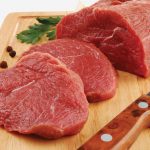 Along with veal, mutton, and pork, the word beef was introduced to English by the French-speaking Normans after they conquered England in 1066. Prior to the introduction of beef, native English words such as ox and cow had been used not only as the names of animals but also as the names of the meat those animals provided. The Old French source of beef was spelt boef, which derived from the Latin bos, meaning ox. Much further back in its history, the Latin bos developed from an Indo-European source, pronounced something like gwous, which also developed, through the Germanic language family, into the word cow. Accordingly, although they resemble each other no more than you and I do, the words beef and cow trace their origin back to the same distant ancestor. Once adopted by English, beef itself became the source of new words. The guards of the British monarch, for example, came to be known in the mid seventeenth century as beefeaters, a term that originated as a disparaging nickname for a servant who ate well but did little. The outlandish theory that arose more than a century ago—that beefeater derives from buffetier, supposedly the name of the guardian of the royal buffet—was proposed by Victorian philologists too pedantic to accept the more obvious meaning of the term. Of course, beef also gave rise to the name of the most English of all meat dishes, beefsteak; this development would hardly be remarkable had the French not adopted the English beefsteak as bifteck, a term that the English then reborrowed in the mid nineteenth century as a high-brow synonym for beefsteak. The existence of these two status-conscious synonyms means that at Tom’s Roadside Cafe you sink your teeth into a juicy beefsteak, but at The Wellington you dine upon a succulent bifteck.
Along with veal, mutton, and pork, the word beef was introduced to English by the French-speaking Normans after they conquered England in 1066. Prior to the introduction of beef, native English words such as ox and cow had been used not only as the names of animals but also as the names of the meat those animals provided. The Old French source of beef was spelt boef, which derived from the Latin bos, meaning ox. Much further back in its history, the Latin bos developed from an Indo-European source, pronounced something like gwous, which also developed, through the Germanic language family, into the word cow. Accordingly, although they resemble each other no more than you and I do, the words beef and cow trace their origin back to the same distant ancestor. Once adopted by English, beef itself became the source of new words. The guards of the British monarch, for example, came to be known in the mid seventeenth century as beefeaters, a term that originated as a disparaging nickname for a servant who ate well but did little. The outlandish theory that arose more than a century ago—that beefeater derives from buffetier, supposedly the name of the guardian of the royal buffet—was proposed by Victorian philologists too pedantic to accept the more obvious meaning of the term. Of course, beef also gave rise to the name of the most English of all meat dishes, beefsteak; this development would hardly be remarkable had the French not adopted the English beefsteak as bifteck, a term that the English then reborrowed in the mid nineteenth century as a high-brow synonym for beefsteak. The existence of these two status-conscious synonyms means that at Tom’s Roadside Cafe you sink your teeth into a juicy beefsteak, but at The Wellington you dine upon a succulent bifteck.
